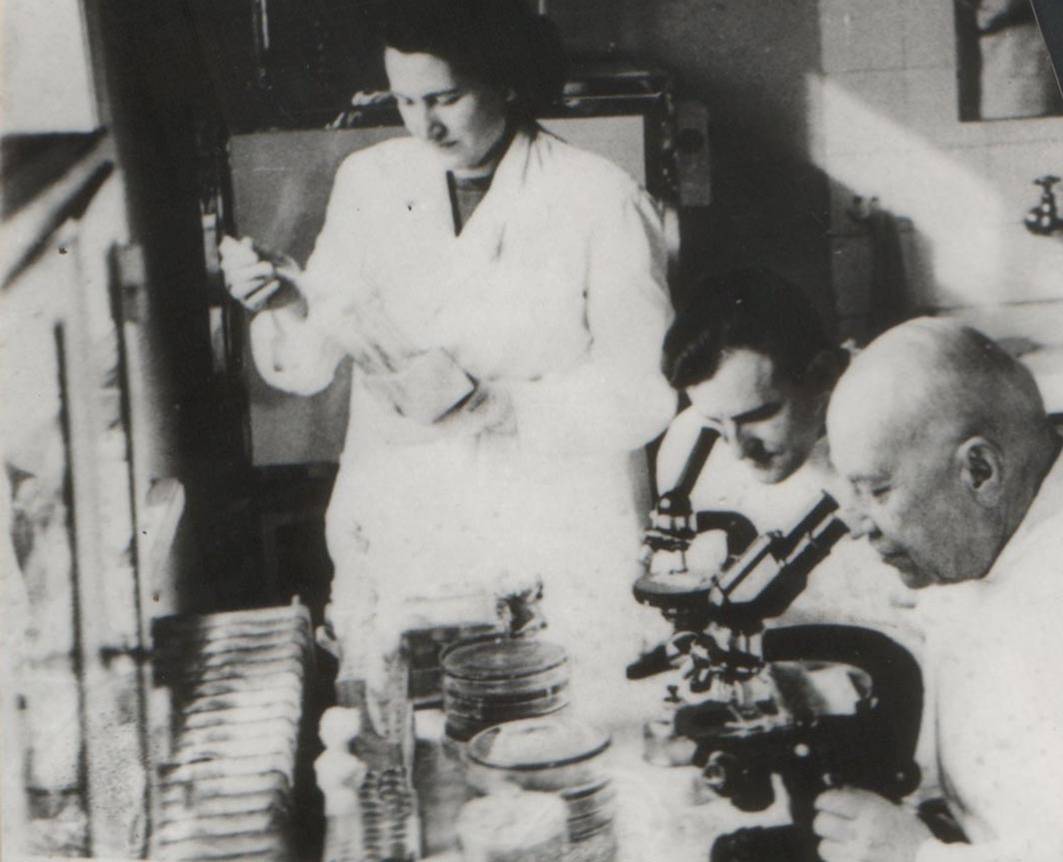The Stephan Angeloff INSTITUTE OF MICROBIOLOGY, Bulgarian Academy of Sciences (BAS) is a national research center in microbiological sciences. Since its foundation the Institute’s strategic lines have been established:
- studies on problems implicated in public health and biotechnology.
- teaching activities and training of PhD students.
History
Academician Stephan Angeloff (1878 – 1964)
The Institute of Microbiology was founded on March 7, 1947 by the world-famous Bulgarian scientist Prof. Stephan Angeloff, Member of BAS, who had been its first director for 15 years.The foundation of the Institute of Microbiology realized the necessity for a formation of a research center with national importance, which to carry out contemporary investigations in rapidly developing and prosperous branches of microbiological science. Five units were founded at first in the Institute: bacteriological (medical, agricultural and industrial bacteriology), protozoological, virological (investigation of viruses and viral diseases in man, animals and plants), immunological and biochemical. The initial period in the development of the Institute (1947 – 1962) was connected with the studies of the actual after the Second World War infectious pathology of domestic animals and humans under the direct leadership of Prof. S. Angeloff and his first collaborator Prof. Ilia Kujumgiev (Read more…).


Today
Nowadays, the Institute comprises scientific staff of 82 scientists including 6 professors, 1 academician (Regular member of BAS), 2 Corresponding members of BAS, 30 associate professors, 61 PhDs, 7 DSc. The research work of the Institute consists of research projects funded by foreign and Bulgarian grants. Presently, a total of over 30 projects are funded by foreign institutions (FP7 of the EC, Horizon 2020, NATO grants, UNESCO, Institut Pasteur, EEA Norway Grants, the Swiss Government, and by companies abroad), and by the National Science Research Fund at the Ministry of Education and Science, Bulgaria.
The educational activities of the Institute include: doctoral studies (35 PhD students within the last five years); training courses for young scientists from the Balkan countries at the Laboratory Center Pasteur; participation in the Leonardo da Vinchi Programme of EC. Thirteen scientists give lectures at nine Bulgarian universities.
Scientists from the Institute participate in scientific councils, editorial boards, councils of organizations and scientific societies in Bulgaria and abroad (such as WHO, IUMS, FEMS, etc.). IMicB is the initiator of the establishment of the Balkan Society for Microbiology, and is the head quarter of this society and the Bulgarian Society for Microbiology. Consultancy is provided for many institutions (governmental, university, private etc) about public health, agriculture, food industry, ecology and environment. Scientists are included in the work of many expert groups among which Expert Council for Prevention of the Population from Natural Disasters and Catastrophes, Expert Council for Epidemiological Control of Infectious Diseases and Immunoprophylaxis, Commission for Eradication of Polyomyelitis at the Ministry of Public Health, Expert Group on Countering the Effects of Biological and Chemical Terrorism at EC, National Agencies of Standardization and Authorization, etc.
International collaboration
The Institute’s activities are widely based on international cooperation, with projects between two or more institutions. We are searching for new projects as part of the international research programs. Scientists from the Institute are respected partners for different scientific organizations abroad, companies, institutes and laboratories.
New scientific bridges have been created between the IMSA and the Saint-Petersburg Institut Pasteur and Institut Pasteur of Guadeloupe (drug-resistant Mycobacterium tuberculosis), Institut Pasteur Paris (human papillomaviruses, genetics of primary HBV/HCV-induced liver carcinoma), German Center of Cancer Research (DKFZ, Heidelberg) (oncolytic viruses), University of Leipzig and the Technical University of Dresden (plant cell cultures and biotechnologies), University of Viterbo and University of Pavia (new enzymes of Antarctic microorganisms), University of Strathclyde, Glasgow (biotechnologies of eukaryotic microorganisms), University of Naples (enzymes from thermopile bacteria) and Institute of Agricultural Sciences and Fishery, Ghent (control on food products), etc.
Some of the dissertation works are part of the international partnership, which finalize as dissertation theses supervised by scientists from the Institute of microbiology and from RIIP, CNRS (France) and others.
